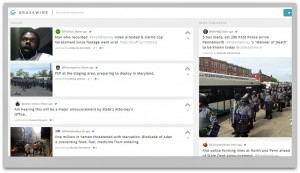Ever wondered what some of the new roles in the digital newsroom look like? Matt Bracken, director of audience engagement at The Baltimore Sun, recently spoke with AJR about how he and his team manage the Sun’s social media accounts and help keep the public informed on what’s going on the minute it happens.
Bracken was hired at the Sun as a sports web producer nearly seven years ago and, following a series of promotions, he landed his current position in August.
What follows are highlights of the conversation, edited for clarity.
AJR: Why did you decide to get involved in audience engagement?
Matt Bracken: I was really interested in continuing to work more with the digital side of journalism. Online production, social media and digital projects were a big part of working in sports but there was also a really heavy print component as well and I wanted to switch my focus almost exclusively to working with digital journalism, web production and connecting with readers in a more engaging way. Also, it was a good opportunity to work with a lot of different departments, beyond just sports.
AJR: What are some of your daily duties?
Bracken: I supervise a team of what we call “community coordinators,” which is just a fancy name for multimedia journalists, and we all take rotations on our main social media accounts. We do some customer service work – we really try to enhance user experience both with the desktop side and the mobile offerings. Additionally, we work on long-term digital projects, web production and I still do some writing. Really it’s a lot of different things and every day is different.
AJR: How are time and resources allocated to all of the various social media accounts?
Bracken: One person on my team has a really strong photojournalism background so she has taken the lead on Instagram. That’s the one, main account that’s basically owned by one person. Besides that, we do a rotation. For example, I was just doing Facebook and Twitter earlier today but now someone else is doing it. We all kind of chip in there, as needed.
We spend less time on Google+, LinkedIn and Pinterest because the referred traffic isn’t nearly as significant as it is from Twitter and Facebook. There are a lot of engaged, passionate people on both platforms, so we definitely put the bulk of our resources into feeding those accounts. Facebook’s the best in terms of referred traffic, and Twitter is second. People will often tweet at the main Baltimore Sun account, be it with service problems with the website, critiques or questions about specific stories or just complimenting us on work we do. So we always try to be really responsive in that avenue.
AJR: Are tweets edited beforehand?
Bracken: On my team, we’re pretty autonomous. It’s almost like copy editors of yesterday are like the social media producers of today. We pay attention to grammar and usage and that kind of thing but we don’t really require anyone to get approval before tweeting. We just try to make sure everyone is aware of the best social media practices and ethics policies.
AJR: How do you navigate between being objective in tweets versus using voice and personality?
Bracken: It’s sort of easy to get caught up in just tweeting out headlines. We’re certainly guilty of that as probably every other news organization is as well. But I think we try to pick the appropriate spots to use a little bit more personality, which usually ends up being more features-oriented stories and sports. If it’s breaking news or something like a serious metro crime story, then we play it straight and by the book. But it’s a balance. It’s hard to describe our overall tone because it varies based on the topic and the seriousness of the story.
AJR: What is the biggest mistake you’ve made on social media?
Bracken: Oh wow, that’s a good question. Well nothing comes to mind immediately, which is probably a good sign. I will say that if we do post something that’s wrong, like a stat or something, we’ll come back and be very transparent with a correction. We don’t try to hide our mistakes. The bottom line is obviously we’re going to be wrong at some point, everyone is, but we try to limit those errors. And if unfortunately they do happen, then we just have to be transparent and as open and honest about it as possible.
AJR: What, if anything, has surprised you about social media?
Bracken: I’m not totally surprised by this, but I’ve found it interesting that simply responding to users on Twitter and Facebook engenders significant goodwill among the community. Being responsive to readers is a huge part of what we do and I think our audience truly appreciates that responsiveness and willingness to help.
AJR: For those out there who may be interested in having a job like yours, what skills would you say are helpful or necessary to have?
Bracken: A good candidate would definitely be someone who has clean copy and comes from a harder news background, has experience dealing with breaking news and can make good, sound news judgments during hectic times. If you have extra digital or technical skills, like a good interactive design background, that’s huge. Coding experience is also really impressive. We really look for a diverse skill set because it’s a job where you need to wear a lot of different hats and be a jack-of-all-trades. In addition to having the traditional “tool box kit” … the more technical skills the better.










Leave a Comment